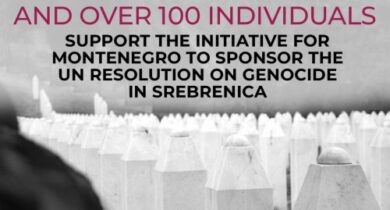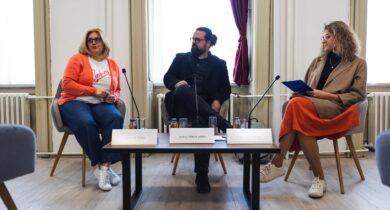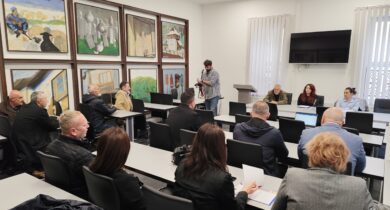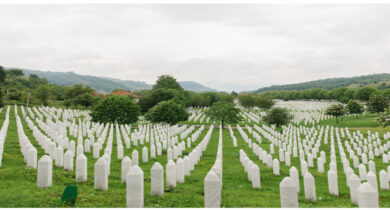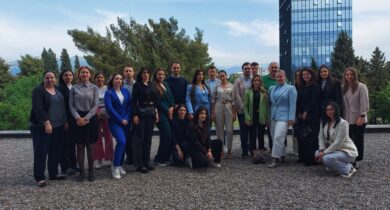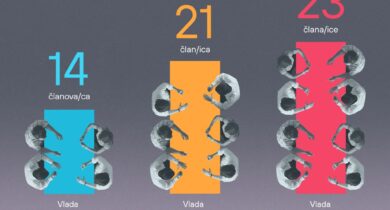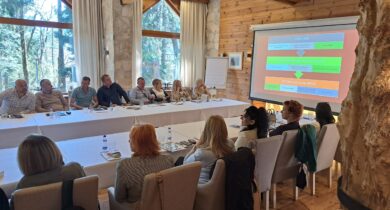The initiative for Montenegro to sponsor a UN Resolution on memorializing the genocide in Srebrenica has been supported by 84 NGOs and over 100 prominent citizens, including numerous public figures who have actively contributed to the public interest in Montenegro for decades. Montenegrin non-governmental organizations have never before united in such numbers to support an… »
April 2024
Strengthening Montenegro’s civic being towards multiculturalism
“Nurturing linguistic and cultural differences must begin with education, foster then within that system rather than stifling them with negative judgments, as diversity reflects the beauty of each individual, and dialogue must be conducted with arguments and facts”, was the message conveyed today at a public forum on interculturalism organized by the Centre for Civic… »
Dialogue and coexistence are the core of multiculturalism
“Rožaje is a multiethnic and multicultural community, and the credit for that belongs to the people of Rožaje. Looking at it more broadly, the government should create policies that contribute to these values taking root completely and everywhere, primarily through educational institutions and programmes that will encourage respect and understanding that differences are not that… »
Initiative for Montenegro to sponsor the UN Resolution on the genocide in Srebrenica
Government of Montenegro Mr. Milojko Spajić, Prime Ministerr Podgorica, 16/04/2024 Subject: Initiative for Montenegro to sponsor the UN Resolution on the genocide in Srebrenica Dear Mr. Spajić, taking into consideration that the draft resolution of the United Nations on the genocide in Srebrenica will be presented on 17 April this year in New York in… »
Through museum education to a more tolerant society
The Centre for Civic Education (CCE) published the publication “Bridges of Multiculturalism through Museum Education – a Teaching Manual”, authored by Filip Kuzman, affirming the use of museum resources as part of assistant teaching material for primary and secondary schools, to improve intercultural competences among young people and consequently the development of a more tolerant… »
Completion of the work of the III generation of the Transitional Justice School after visiting sites of war crimes
The Centre for Civic Education (CCE) organized, from 13 to April 2024, a study visit for participants of the III generation of the Transitional Justice School, during which they visited the places of suffering in the territory of Montenegro and became familiar with specific locations associated with war crimes from the 1990s – Deportation, Morinj,… »
Public call for participants in training for secondary and primary school teachers
The Centre for Civic Education (CCE) announces PUBLIC CALL for participants in training teachers of secondary and primary school in the social science group of subjects for the use of modern teaching methods in teaching multiculturalism The public call is open to all primary and secondary school teachers in the social science subjects in the… »
“Reshaping” Governments without strategy
The previous three Governments of Montenegro exhibited significant variations in the number of members, ranging with 14 in the Zdravko Krivokapić’s Cabinet, over 21 in Dritan Abazović’s, to a record high of 23 in the Government of Milojko Spajić. Krivokapić’s Government had the fewest deputy prime minister positions – just one, while Spajić’s had the… »
Interdisciplinary education through museum artifacts
Centre for Civic Education (CCE) organized a training, on 8 and 9 April in Kolašin, for 25 secondary and primary school teachers from different parts of Montenegro on methods of utilizing museum education in teaching young people and developing their intercultural competences. The training was conducted by historian Miloš Vukanović, and Vukan Ražnatović, the director… »
Students must be proactive in the fight for their rights and a better society
Centre for Civic Education (CCE), on the occasion of Student Day, emphasizes the importance of developing critical thinking and activism among young people, particularly in the context of the potential carried by the student population, which unfortunately remains chronically marginalized in the Montenegrin context due to the lack of proactivity from students and the undervaluing… »

